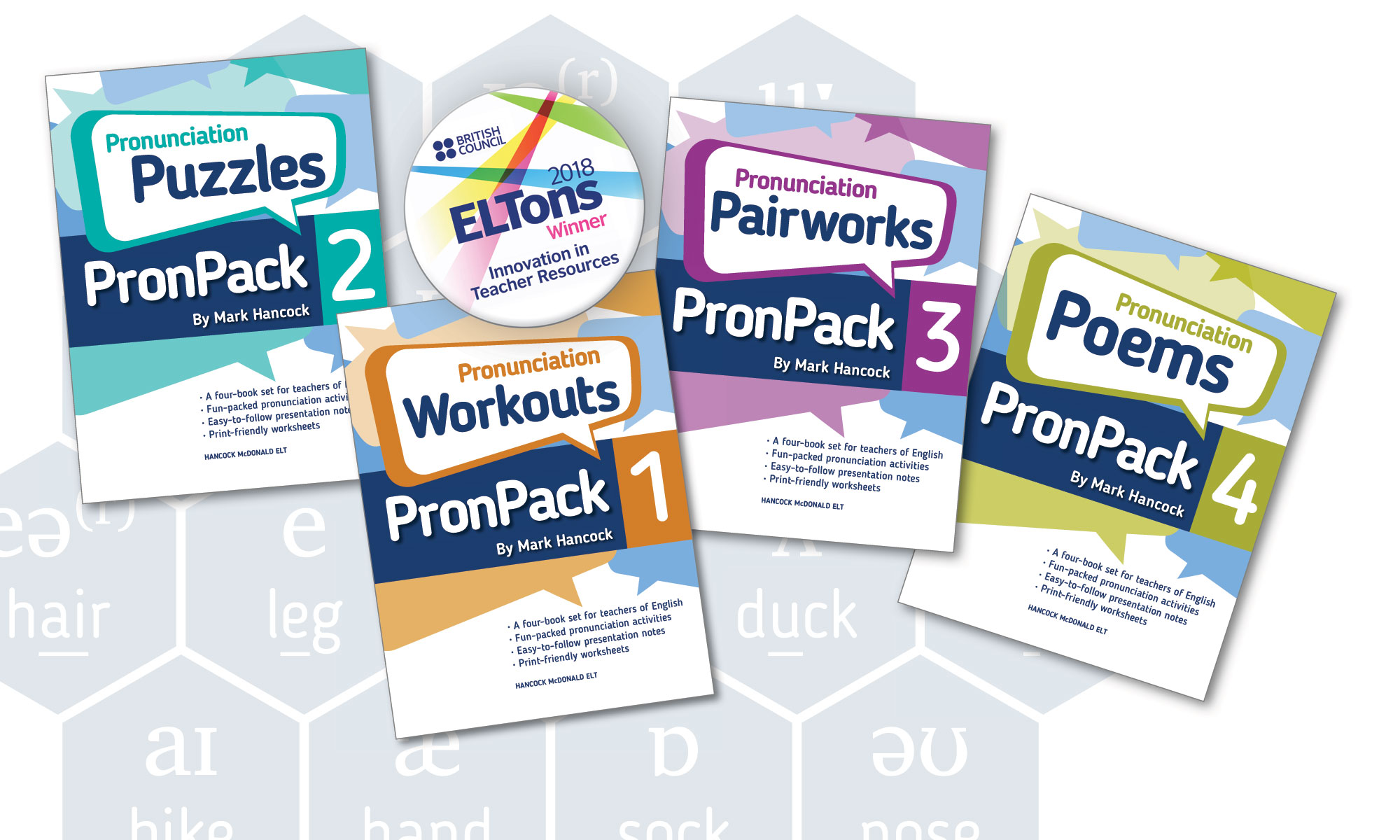We sometimes dehumanize pronunciation in the way we talk about it. If a learner mispronounces a word, we might say, ‘It isn’t pronounced like that; it’s pronounced …’ (and then we model the ‘correct’ way). In the dictionary, there are transcriptions to tell us how words are pronounced. Talking about weak forms, we might say, ‘In these words, the vowel sound is reduced to a schwa’. On the topic of word stress, we might say, ‘Most two-syllable nouns are stressed on the first syllable’. I’ve highlighted the verb forms above to demonstrate how easy it is to slip into the passive when talking about pronunciation, which is fine, but what it does is conceal the identity of who is doing the action. It doesn’t tell us who pronounces things this way – it removes the human from the equation.
PronPack at IATEFL 2019!

PronPack’s in Australia so Australia’s in PronPack!

PronPack is now available in Australia from Bookery! To celebrate, we have added Australia to our atlas of “Air Traffic Control”boards – see a free sample of the game here. Download the various versions here (Activity 3.1 New Versions).
ELF: Beyond Dogma and Denial
This article was first published in Speak Out issue 60. Speak Out is the journal of the IATEFL Pronunciation special interest group. In this article, I will suggest that following the recognition of English’s role as a global Lingua Franca, there has been an impasse created by two conflicting reactions: dogma and denial. I will discuss the possible implications of ELF for pronunciation teaching goals, and suggest how we can distinguish features which are important for global intelligibility from those which are not. I will highlight the importance of distinguishing productive and receptive goals, and consider the issue of what part models play in a context where accent variability is a central concern. I will consider contexts where simple intelligibility is not enough. Finally, I will suggest that a shift in how we express goals, from product (model accent) to process (accommodation) may provide a means of getting past the impasse of dogma and denial. Continue reading “ELF: Beyond Dogma and Denial”
Top Ten Tips for Teaching Pronunciation
 1 Know your objective. Pronunciation is about being understood by people all over the globe. It’s not about pretending to be American or British. You don’t need to teach every small detail of the way they speak in the US or UK – very few learners will ever learn that, and there is no reason to anyway. English is a world language now – it doesn’t belong to any particular country.
1 Know your objective. Pronunciation is about being understood by people all over the globe. It’s not about pretending to be American or British. You don’t need to teach every small detail of the way they speak in the US or UK – very few learners will ever learn that, and there is no reason to anyway. English is a world language now – it doesn’t belong to any particular country.
2 I’m OK! Say that to yourself. Teachers sometimes feel they aren’t a good pronunciation model because they aren’t ‘native speakers’. That’s not true. If you are an intelligible speaker of English, you are a perfect model. When we think of English as a lingua franca, the term ‘native speaker’ no longer makes sense – we are all native speakers of it!
PronPack Arrives in Brazil!
We’re delighted to announce that PronPack is now available in Brazil from the SBS Livraria International and it’s at a great discount!
British Council Webinar!

Watch a recording of this webinar with Mark Hancock here. It took place December 13th 2018.
PronPack wins an English Speaking Union prize!

PronPack 1-4 has won an ESU prize for teacher resources in a ceremony in London on Nov 20th 2018, runner up behind David Farmer’s ‘Power-Up’ (NILE). This means that PronPack has now won two main ELT materials prizes in the same year – a rare achievement!
Sounds and Spelling

It is not always clear if sound and spelling patterns are a matter of pronunciation or of literacy, and for that reason perhaps it is sometimes overlooked in pronunciation teaching. However, in my experience, most learners come to pronunciation class already under the influence of written words and spelling-induced errors are some of the most frequent problems.
Oronyms

Homophones are sometimes more than a word. Sometimes phrasal homophones are called ‘oronyms’ In this example, the two phrases are phonetically identical, and this is made possible by the phenomenon of linking: in this instance, it is not possible to say with certainty whether a /t/ consonant is at the end of one word or at the beginning of the next!



